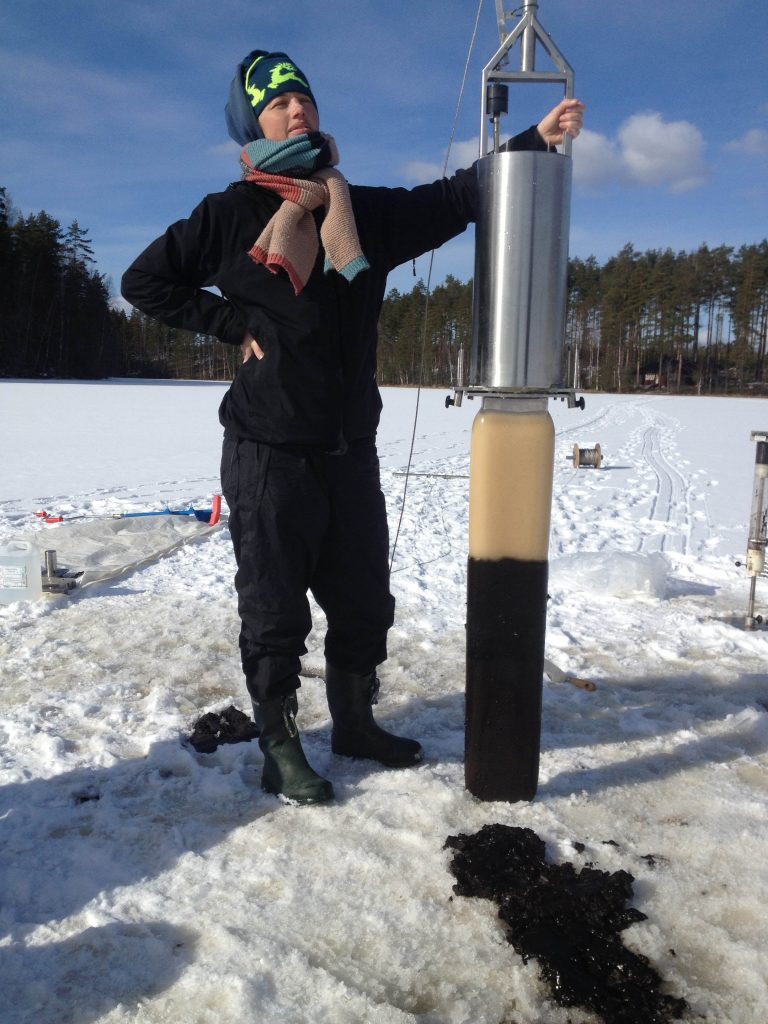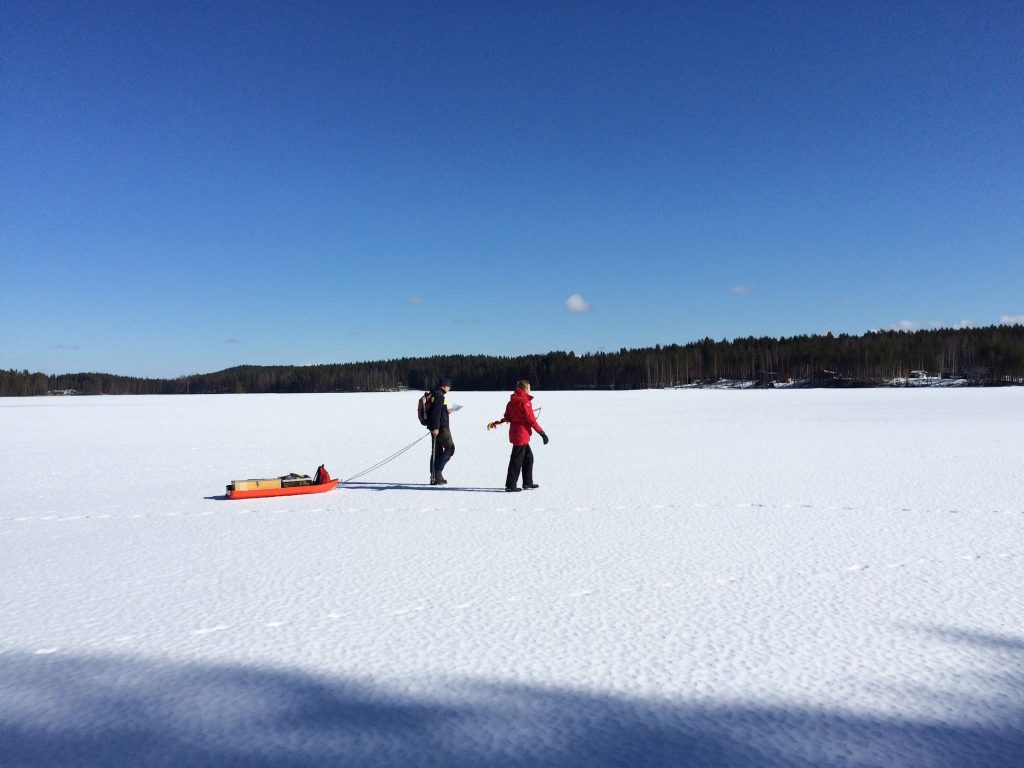Meet Emma Kritzberg, an associate professor of Aquatic Ecology with an emphasis on biogeochemical cycling in freshwater, estuarine and marine systems. Her job includes teaching 15%, doing service (director of undergraduate studies and committee work) 25%, and doing research 60%.

What did inspire you to pursue a career in marine sciences/technologies?
I did my undergraduate education at Uppsala/Lund University and then went on to do a PhD in Lund. All of my field work was done in the US in collaboration with American researchers. After my PhD defense in 2005, I was in doubt whether I should pursue an academic career, but decided to try to get funding for a postdoctoral stay, which was successful. The 1-yr post doc was at an institute in Mallorca and included a switch from limnic to marine work. During my post doc I applied for and received an early career grant, and this brought me back to Lund for a 4-yr period. At this point my former PhD supervisor was highly supportive and pushed that I was employed at a tenure track position in 2008. I became docent in 2011 and was promoted to associate professor in 2012. I now run a research group with three PhD students.
When I first started my university studies I rapidly decided to finish my education and make use of it “in the real world” as soon as possible. Since then I have clearly changed my view on what “the real world” is, to include the university. And the reason I have stayed in academia is simply that I enjoy the research and teaching so much. Getting ideas and questions, thinking about ways to address and answer them together with students and trying to understand the data we produce never gets old. Learning together with students is the most rewarding aspect of the job.
What are your main professional achievements?
- Recruiting fantastic PhD students and building a positive working environment.
- Bridging the gap between scientists and management/policy makers/stakeholder regarding causes, consequences and potential mitigation measures regarding freshwater browning. This has included a workshop, a public conference and the writing of a synthesis article.
- Showing that iron concentrations are in the rise in a wide range of freshwaters and that this contributes to browning.
- Showing that land-use, in addition to recovery from acidification and climate change, is a factor contributing to browning.
- The use of a wide range of approaches to make progress in science – from historical data found in old archives to advanced analytical methods such as synchrotron based methods.
- Running a highly appreciated undergraduate course in aquatic ecology using project based learning and realistic assessment methods (e.g. doing small research projects presented in poster presentations, written reports or oral presentations, writing debate articles and doing oral debates, in contrast to traditional exams).
What did help you to build your academic career?
- Career development programs, which helped me read the map and find my own compass to navigate the academic world, and put me in contact with great young researchers at different faculties.
- Courses to develop supervision and teaching.
Did you have any role models that led you to this career? How did they influence you?
Especially in the beginning of my academic career, I found that there was a lack of role models. I had a hard time relating to the more senior people I had around me, which were mostly men and were in my view too caught up in their own position in the academic world. The good friendship among the PhD students was a huge plus and source of energy. And the general atmosphere in the department is much more collaborative than competitive. Many people have been inspirational in different ways. I was very inspired from my periods in the US and Spain where I felt that the researchers were amazing scientists and also retained a strong interest and connection to society outside academia. There was a continuous discussion around politics and culture. In more recent years I have several persons around me who have a devoted and professional commitment to education and the role of science in society, and this I find highly inspirational.

Have you ever had any difficulties in your career due to your gender? If yes, how did you handle them?
I have only twice experienced that someone has intentionally tried to hinder me from advancing, and many more times have I been encouraged and supported. But I have lost a lot of energy on frustration over established scientists being more focused on their ego and stature in the field than on the quality of science and education. And on poor leadership.
Have you have difficulties in your career due to your family responsibilities? What helps to maintain balance of your professional and personal life?
I have three kids, which are now 8, 13 and 16 years old. We had our first child during my PhD education, the second in between my PhD defense and the international post doc, and the third when I had started my tenure track position. Having children has made a difference to my academic career of course. Having a child during my PhD period was only a positive thing – it gave me a break without really loosing any time from my project, and when I came back to work my efficiency gained tremendously from having fewer hours to invest at work. Having a small child during my post doc was a constraint to my work. The research activities at the institute were very focused on research cruises which lasted >4 weeks, which I could not participate in, so I had to be creative to find ways to do my research. When I had my third child I only took a very limited period of full time parental leave, because the duration of the tenure track was not flexible to parental leave and all time was in that sense “lost” from advancing my merits to be legible for a permanent position. In all, I think having a family has helped me keep a sound relationship with my job. I can only invest so much time, and my self-esteem do not rest only on academic achievements.
Also, a supportive spouse helps me and the Swedish social welfare system and a work culture that is positive towards parental leave and encouraging proper vacation.
What advice would you give any women considering science as a career path?
- Try to take some periods when you leave the “musts” to the side for a while. One being that one always “must” apply for funding. I have taken entire years where I just focus on ongoing projects or unfinished papers, because always striving towards the next goal/stepping stone and not having time to concentrate on present work can be very demotivating, I find.
- Find some people you enjoy working with and hold on to them.
- Decline the tasks that are often given to junior females and presented as “a good experience” but in reality just takes time and has little reward – such as organizing internal “unit days”/team building activities and such.
- Remember that the general perception that women are more emotional at work is a myth. More often it is men that have invested a lot of emotions into their job and are therefore a bit sensitive about it.